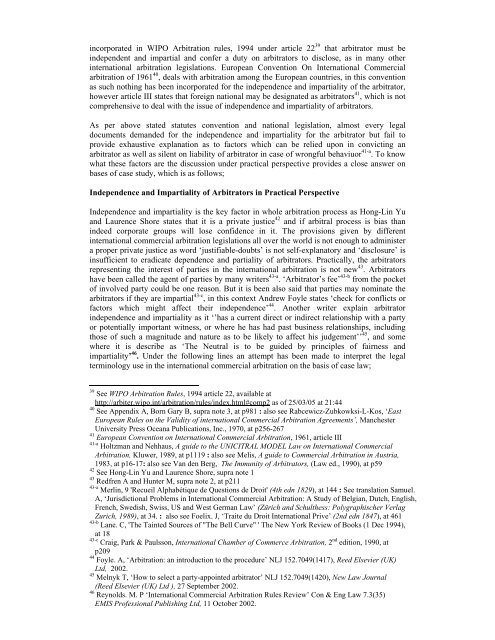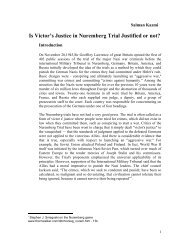Independence and Impartiality of arbitrators in international ...
Independence and Impartiality of arbitrators in international ...
Independence and Impartiality of arbitrators in international ...
You also want an ePaper? Increase the reach of your titles
YUMPU automatically turns print PDFs into web optimized ePapers that Google loves.
<strong>in</strong>corporated <strong>in</strong> WIPO Arbitration rules, 1994 under article 22 39 that arbitrator must be<br />
<strong>in</strong>dependent <strong>and</strong> impartial <strong>and</strong> confer a duty on <strong>arbitrators</strong> to disclose, as <strong>in</strong> many other<br />
<strong>in</strong>ternational arbitration legislations. European Convention On International Commercial<br />
arbitration <strong>of</strong> 1961 40 , deals with arbitration among the European countries, <strong>in</strong> this convention<br />
as such noth<strong>in</strong>g has been <strong>in</strong>corporated for the <strong>in</strong>dependence <strong>and</strong> impartiality <strong>of</strong> the arbitrator,<br />
however article III states that foreign national may be designated as <strong>arbitrators</strong> 41 , which is not<br />
comprehensive to deal with the issue <strong>of</strong> <strong>in</strong>dependence <strong>and</strong> impartiality <strong>of</strong> <strong>arbitrators</strong>.<br />
As per above stated statutes convention <strong>and</strong> national legislation, almost every legal<br />
documents dem<strong>and</strong>ed for the <strong>in</strong>dependence <strong>and</strong> impartiality for the arbitrator but fail to<br />
provide exhaustive explanation as to factors which can be relied upon <strong>in</strong> convict<strong>in</strong>g an<br />
arbitrator as well as silent on liability <strong>of</strong> arbitrator <strong>in</strong> case <strong>of</strong> wrongful behaviuor 41-a . To know<br />
what these factors are the discussion under practical perspective provides a close answer on<br />
bases <strong>of</strong> case study, which is as follows;<br />
<strong>Independence</strong> <strong>and</strong> <strong>Impartiality</strong> <strong>of</strong> Arbitrators <strong>in</strong> Practical Perspective<br />
<strong>Independence</strong> <strong>and</strong> impartiality is the key factor <strong>in</strong> whole arbitration process as Hong-L<strong>in</strong> Yu<br />
<strong>and</strong> Laurence Shore states that it is a private justice 42 <strong>and</strong> if arbitral process is bias than<br />
<strong>in</strong>deed corporate groups will lose confidence <strong>in</strong> it. The provisions given by different<br />
<strong>in</strong>ternational commercial arbitration legislations all over the world is not enough to adm<strong>in</strong>ister<br />
a proper private justice as word ‘justifiable-doubts’ is not self-explanatory <strong>and</strong> ‘disclosure’ is<br />
<strong>in</strong>sufficient to eradicate dependence <strong>and</strong> partiality <strong>of</strong> <strong>arbitrators</strong>. Practically, the <strong>arbitrators</strong><br />
represent<strong>in</strong>g the <strong>in</strong>terest <strong>of</strong> parties <strong>in</strong> the <strong>in</strong>ternational arbitration is not new 43 . Arbitrators<br />
have been called the agent <strong>of</strong> parties by many writers 43-a . ‘Arbitrator’s fee’ 43-b from the pocket<br />
<strong>of</strong> <strong>in</strong>volved party could be one reason. But it is been also said that parties may nom<strong>in</strong>ate the<br />
<strong>arbitrators</strong> if they are impartial 43-c , <strong>in</strong> this context Andrew Foyle states ‘check for conflicts or<br />
factors which might affect their <strong>in</strong>dependence’ 44 . Another writer expla<strong>in</strong> arbitrator<br />
<strong>in</strong>dependence <strong>and</strong> impartiality as it ‘’has a current direct or <strong>in</strong>direct relationship with a party<br />
or potentially important witness, or where he has had past bus<strong>in</strong>ess relationships, <strong>in</strong>clud<strong>in</strong>g<br />
those <strong>of</strong> such a magnitude <strong>and</strong> nature as to be likely to affect his judgement’’ 45 , <strong>and</strong> some<br />
where it is describe as ‘The Neutral is to be guided by pr<strong>in</strong>ciples <strong>of</strong> fairness <strong>and</strong><br />
impartiality’ 46 . Under the follow<strong>in</strong>g l<strong>in</strong>es an attempt has been made to <strong>in</strong>terpret the legal<br />
term<strong>in</strong>ology use <strong>in</strong> the <strong>in</strong>ternational commercial arbitration on the basis <strong>of</strong> case law;<br />
39 See WIPO Arbitration Rules, 1994 article 22, available at<br />
http://arbiter.wipo.<strong>in</strong>t/arbitration/rules/<strong>in</strong>dex.html#comp2 as <strong>of</strong> 25/03/05 at 21:44<br />
40 See Appendix A, Born Gary B, supra note 3, at p981 : also see Rabcewicz-Zubkowksi-L-Kos, ‘East<br />
European Rules on the Validity <strong>of</strong> <strong>in</strong>ternational Commercial Arbitration Agreements’, Manchester<br />
University Press Oceana Publications, Inc., 1970, at p256-267<br />
41 European Convention on International Commercial Arbitration, 1961, article III<br />
41-a Holtzman <strong>and</strong> Nehhaus, A guide to the UNICITRAL MODEL Law on International Commercial<br />
Arbitration, Kluwer, 1989, at p1119 : also see Melis, A guide to Commercial Arbitration <strong>in</strong> Austria,<br />
1983, at p16-17: also see Van den Berg, The Immunity <strong>of</strong> Arbitrators, (Law ed., 1990), at p59<br />
42 See Hong-L<strong>in</strong> Yu <strong>and</strong> Laurence Shore, supra note 1<br />
43 Redfren A <strong>and</strong> Hunter M, supra note 2, at p211<br />
43-a Merl<strong>in</strong>, 9 'Recueil Alphabétique de Questions de Droit' (4th edn 1829), at 144 : See translation Samuel.<br />
A, ‘Jurisdictional Problems <strong>in</strong> International Commercial Arbitration: A Study <strong>of</strong> Belgian, Dutch, English,<br />
French, Swedish, Swiss, US <strong>and</strong> West German Law’ (Zürich <strong>and</strong> Schulthess: Polygraphischer Verlag<br />
Zurich, 1989), at 34. : also see Foelix. J, ‘Traite du Droit International Prive’ (2nd edn 1847), at 461<br />
43-b Lane. C, 'The Ta<strong>in</strong>ted Sources <strong>of</strong> "The Bell Curve" ' The New York Review <strong>of</strong> Books (1 Dec 1994),<br />
at 18<br />
43-c Craig, Park & Paulsson, International Chamber <strong>of</strong> Commerce Arbitration, 2 nd edition, 1990, at<br />
p209<br />
44 Foyle. A, ‘Arbitration: an <strong>in</strong>troduction to the procedure’ NLJ 152.7049(1417), Reed Elsevier (UK)<br />
Ltd, 2002.<br />
45 Melnyk T, ‘How to select a party-appo<strong>in</strong>ted arbitrator’ NLJ 152.7049(1420), New Law Journal<br />
(Reed Elsevier (UK) Ltd ), 27 September 2002.<br />
46 Reynolds. M. P ‘International Commercial Arbitration Rules Review’ Con & Eng Law 7.3(35)<br />
EMIS Pr<strong>of</strong>essional Publish<strong>in</strong>g Ltd, 11 October 2002.



